|
So I am running to be re-elected as school trustee for the West Vancouver School District, which comprises West Vancouver, Bowen Island and Lions Bay. As part of that, I would like to address the three key questions that constituents ask. Here we go:
Why am I running again? Because our school system is the core of our society where we educate and get the next generation ready for entering into a rapidly changing and uncertain world. Trustees make a direct impact on this. I have done this for the last four years and together with the other trustees we accomplished a lot. Consensus, calm and reasoned debate as well as respect of all viewpoints define my approach. My background in business and living all over the world has enabled me to give a unique contribution to this. I get energy from it, I meet with parents, educators and community members and translate their feedback and concerns into action. I really enjoy it and when you enjoy something it generates energy that in turn energizes other people. I believe that the administration, teachers and support staff have been able to work in a very positive environment as a result and consequently been able to deliver the best possible education for the children in our district. We have something very unique in West Vancouver and I want to ensure we preserve and keep improving it. What was accomplished during the first term? Quite a bit, a selection:
It is not always visible to the outside world, but as trustees we do a lot to ensure all these things get realized on an ongoing basis. What are the goals for the next four years? During the last election I campaigned on
I have worked hard on all five and significant progress was made in each area. Our district is stronger than ever, in educational terms but also in financial terms. More importantly, there are a few new things on the horizon that will get attention and I will add these to my five core points. The most important one is post-secondary learning and careers. Where do your kids go? Why are so many failing at university? Where is the increasing ‘gap year’ trend coming from? These are vital questions and our schools have to start playing a role in tracking post-secondary careers and see how we can better prepare our students for their lives in the challenging world that awaits them when they graduate from school. This needs more attention and work. And generally, with the coarsening of the tone of the political debate I will continue to argue and strive for reasoned debate and respect of all viewpoints. We have been good at that in our district and we need to ensure that we will continue doing that and ensure our provincial partners will play by the same standards. At the same time there is a round of bargaining with the teachers union ahead of us and I feel that we should continue to build consensus and avoid the dramas we have witnessed in this area in BC in the recent past. The past four years have been good in our school district, but we have to work hard to preserve that and improve things where we can.
0 Comments
Two years into the job, a school trustee reflects and looks ahead
Almost two years ago British Columbia got a whole new batch of school trustees and, since I am one of them, now may be a good time to reflect on this role and evaluate if public education is moving in the right direction or not. To begin with, the way public education is organized in British Columbia is somewhat convoluted. A model of co-governance between provincial authorities and local trustees creates a situation where each school district’s budget is essentially set for 85% by the province, compensation levels for all staff are negotiated and controlled at the provincial level as is the curriculum. This does not mean that elected trustees have nothing left to govern over – they absolutely do – but it does narrow their mandate to basically overseeing the execution of policies that are set at a higher level of government. As trustee I for instance would like to tweak the curriculum here and there and it would be great to create certain incentives for administrative and teaching staff, but I can’t. Even offering a leased car to a teacher driving from far is out of the question under the current structure. The entire set-up of public education is such that it seriously limits structural innovation and that is not just because the provincial government is such a dominant player. Each professional group that participates in the existing process, teachers, principals, admin staff, trustees, parents has their own organization with in turn their own employees, and, as I have found out, their own legal advisors. So much for the idea of ensuring that every dollar goes into the classroom as almost the entire system is funded by public means. Think of it as a carefully constructed house of cards and as long as each component plays its part and gets funded properly, things are fine. In fact they are good enough for everyone that there is little incentive to change anything. So the problem arises when certain events start to test this system and cracks emerge. The disruptive strike actions by the province’s teachers union, the BCTF, and the endless pressures from the provincial government on school districts to make and find administrative savings have put exactly this kind of pressure on public education in BC. Just take a casual look at the #bced hashtag on Twitter on any given day and you will get the idea of the state of affairs: not good. And while there is a lot to talk about, the debate has now almost entirely focused on ‘funding’, which has led to a totally unproductive discussion between the various parties, most notably between trustees and the provincial government. Having sat in on meetings with the minister, MLAs and having seen the financial impact on day-to-day operations it remains a mystery to me how it is impossible with so many adults in the room to reach a workable consensus about funding public education. Not exactly the example to those we purport to educate. While this relationship is billed as co-governance between government and trustees, it is anything but. My inbox is filled on a weekly basis with letters from other school districts to the minister of education outlining the serious impact the current funding mechanism and budget cuts have had on the ability of local school districts to deliver adequate education and avoid school closures. These letters get a polite ministerial response, but do not lead ever to meaningful action. It is pretty much a one-way street and with a provincial election coming up in 2017, the BC Liberal government has now started to address these concerns by rolling out some ad-hoc funding announcements. While no one suggests we should not be grateful for extra dollars flowing into the system, even some highly motivated BC Liberal supporters have started to roll their eyes over the cynical treatment of education: first as a line item to balance the budget, then as a prop to get some votes. From my perspective this is all the more galling as globalization and rapid innovation have made it clear that the one asset we have to invest in is our future generation. No matter where you stand politically, it is not exactly a pretty picture. The problem is the funding mechanism itself, the very formula that gives a per pupil amount of dollars to each district which does not cover the costs to adequately operate any school district and as a result education suffers. But I would like to go further than that, as the continued ‘funding’ debate takes away from the structural issues in public education. If anything the recent crisis has underlined that districts are increasingly losing their independence and during my election campaign I pointed to the real danger of a government embarking on district amalgamation in order to save costs. This process has already started with the ‘shared services’ program, a noble idea, but for some districts this increases costs and as I mentioned, it may be the precursor to further attempts to squeeze public education. And then there is the totally broken model of contract bargaining where teachers, students and parents are held hostage by a completely outdated model of labour (or ‘industrial as we used to call it) relations which has brought pain and grief to all parties involved, yet no one has the political guts to really do something about it. During my first few years as trustee I am still at a loss how to rationally explain to inquiring parents the fact that a union can shut down an entire school system with a government taking its time to resolve the conflict at hand. Anger and frustration all over the place, yet the moment employers and union strike a deal everyone is back to work and conveniently forgets about the high likelihood of having to sit through the entire movie again four years down the road. Again we are falling short of providing a framework and example of how to co-operate and build consensus to those we are educating. Many have called for a Royal Commission to assess the state of public education in British Columbia and see if a set of recommendations – binding or not – could help move a constructive debate on structural reform. I am in favour of that but also fear that some of the vested interests will be quite reluctant to open the door to sweeping change. And despite all the noise from the province’s political parties, education never features high on the list during a campaign or, come to think of it, once a party is elected and forms government it is back to the usual pattern when it comes to public education. Yet redefining the funding formula, giving more flexibility to local districts and even consider to go back to local district bargaining under a set of drastically rewritten labour laws should all be on the table. Most of this is something that requires trustees to work together and influence the politicians of BC’s political parties which often is as simple as writing a short article like this one. In the meantime trustees – like myself – can bring tremendous value to their districts and have fun at it too. Working with local staff and teachers to encourage them in their work is incredibly rewarding, at least that is what I have discovered. In my district teaching staff are putting together the fourth consecutive TedXWestVancouver Education and earlier this year organized 'Ignite the North Shore’, both events that brought out an incredible amount of energy, new ideas, enthusiasm and fun from educators. I was also pleased to do a presentation to one elementary school assembly on my mountain climbing experiences and was equally exited to present career thoughts to a high school class on entrepreneurialism and how recent trends affect our students when they map out their futures. Even the most cynical observer of public education would come away inspired after having attended these events and understood the many opportunities on the learning side of things. It leads me to think that if politicians cannot reform education, the grassroots educators over time will generate the sort of energy that is required to do that, supported hopefully by their local trustees. The BCTF too should change course and focus on whether there are teacher’s jobs fifty years from now and what they will look like rather than keep itself busy with bruising political fights over dollars. They have the knowledge and expertise to be a constructive partner in all of this. For me, getting involved at the local school district level allows you to realize the enormous energy and high quality of learning we offer in British Columbia and how utterly ridiculous it is to risk all of that by playing political games in a system that is not really designed for that. First and foremost, the system is designed to educate. If we can’t get it to do that properly we must fix the system first. Note: I was elected as trustee in November 2014 in School District 45, which comprises West Vancouver, Bowen Island and Lions Bay. British Columbia struggles with an age-old issue
During the election campaign for school trustee in late 2014, I was asked what I thought about government funding for private schools. The answer I gave was both political and frank. Yes, I said diverting increasing amounts of public funds to privately funded or independent schools was something that warranted our attention and review, but at the same time I recognized the need for a society to support what I would term ‘denominational’ schools. I was not sure if I managed to address that particular question, but I do think my response covered the complexity of the issue. My answer was partly rooted in my Dutch background. In 1848 the right to education, any education, was enshrined in the constitution of The Netherlands by an at the time classical liberal government. It sought to ensure not only freedom to education, but also to settle the religious conflict that had defined the nation from its early days when its Protestant elites rebelled against the Catholic monarch in the late 16th century. Tensions between Protestants and Catholics remained fairly potent well into the 20th century, not to mention the eventual fracturing of the Protestant church into various sub-groups with their own agendas. In simple terms the education system that evolved in The Netherlands over time was one where any group, Protestant, Catholic, Jewish, Muslim, Humanist or any set of beliefs could form a school, as long as it met certain educational and curriculum standards, something that was and continues to be enforced by inspectors from the central government. To this day I remember when word got around at my elementary school that we were to be on good behaviour as an ‘inspector’ was coming to see if our school was compliant. Day to day administration of the schools was left to the municipalities and as opposed to North America there are no elected school boards. In 1920 funding was increased to such levels that all schools of all denominations got centrally funded. In British Columbia the government funds private schools with select grants that help cover the cost of education, but these are not nearly enough which is why parents that send their children to such schools face a significant financial barrier. Supporters of the public system argue that growth of this type of funding has outstripped the growth in funding to public schools and that the taxpayer is financing elite educational facilities while the public system has to do with less and less every year. The counterpoint to this is that parents that let their children attend independent schools in fact subsidize the government or better put: they have to pay a premium as the government is not prepared to pick up the full per student cost as it is doing for those attending public schools. Both sides here have a point. It should be noted that in Canada where education is specifically delegated to the provinces each province has its own approach. Ontario is a notable example where Catholic schools are funded out of the public purse – a somewhat historical anomaly – and attempts by other groups in that province to obtain similar funding have been thwarted by the courts whose rulings were based on an interpretation of Canada’s Constitution Act of 1867. There is no point in comparing the Dutch system, which hails from a very different historical context and the situation in Canada and British Columbia in particular, which in its present format emerged only in 1977 when premier Bill Bennett introduced the current practice of partly funding private schools through operating grants out of the public purse. However contrasting these two approaches brings into focus the same fundamental question: does government fund public education only or does it fund all forms of education (with a possible carve out for the most elite outfits that don’t need any funding anyway)? It poses a challenge to any society that sees itself as multicultural, plural, open, tolerant and liberal. Why not grant each group within your society the same level of educational freedom and fund it publicly in order to maintain the highest degree of openness and create the same level of opportunity for each and every child of whatever denominational background and thus the same chance at success? Or are we in a post-denominational era where we can expect everyone to partake in public education and pursue any religious or other specialized forms of education outside the school day? The Dutch have re-opened that debate to some extent as churches are emptying out while Muslim schools appear to be the key beneficiary of the 19th century law that sought to provide equal educational opportunities for all. So is there a solution? At first sight it seems binary: either you fund all schools equally or you don’t and that is probably the way that adherents of each camp appear to prefer. It leads us to a parallel fundamental question, which is how education should be funded anyway, is it a private cost or is it the public purse? Or both? And in the latter case I would argue that even the most generously funded public system does require some form of parent support through fundraisers, co-payments or whatever format that helps maintain the overall and generally high cost of education. The impracticalities and complexities however make it impossible to take either route right away. Defunding independent schools and diverting the funds back to the public system may cause pressures on that very public system and force students back into a setting where their specific or denominational needs are not met. Alternatively, bankrolling all public and independent schools may be too costly of an exercise and upset the difficult fiscal balance that each Canadian province tries to find. And then some cynics may argue that the long march to privatization of British Columbia’s school system with less and less dollars for public schools is well underway and is a deliberate ploy by the current provincial government. This position, whatever its merits, doesn’t make a productive discussion all that easier. As trustee in a publicly funded district I have a mandate to look after the interests of public education. Yet, that means that at the same time we are asked to evaluate the issues raised over public funding for independent schools. It seems that we need to get back to the drawing board on many aspects of education in British Columbia, from governance to funding to curriculum, so we might as well add this one to the debate. Disclosure: I attended a publicly funded elementary private school in The Netherlands in the where liberal arts, independent inquiry and distrust of authority (hence our ability to address our teachers with their first name) were the foundational pieces of the school. It was well ahead of its time in many ways and looking back it was a real product of the free thinking movements of the 1970s. Following this my parents sent me to a publicly funded secondary Protestant school (despite the strong atheist overtones in our family) where on day one I was blasted by one of the teachers for having attended an ‘elitist’ private school, which it really wasn’t but it gives you an idea of the deep emotions around an issue in a country that had supposedly fixed the issue of independent schools. The election is over and the result was good. Thanks to all who voted for me, supported me or otherwise played a role during the five week campaign for school trustee in West Vancouver, Bowen Island and Lions Bay. I met many new people and learned a lot about the three communities that constitute School District 45. The campaign dynamics were equally engaging and I developed great relationships with the other school trustee candidates, current and former trustees and also made some new friends running for the various municipal councils in the district.
And now it is time to get to work. Together with Carolyn Broady, Nicole Brown, Sheelah Donahue and Dave Stevenson I will become part of the new board of trustees that will be inaugurated on December 2, 2014 at the district’s board office in West Vancouver. We have been elected to a four year term which will give us quite a bit of time to work for and engage with education and the many challenges it faces. Thanks again for giving me this opportunity. Although trustee candidates do not get to speak, I will probably be handing out campaign material at this event tonight:
West Vancouver Chamber of Commerce - All Candidates Meeting Date and Time: November 12, 2014 at 7:00 pm Location: Kay Meek Centre, 1700 Mathers Avenue, West Vancouver This is the last public event for the elections, the remaining days will focus on informal networking, checking to see that the election signs are still standing and possibly, I say possibly, an early morning wave at the Lions Gate Bridge on Friday morning. Thanks for all the support and probing questions so far, they have helped me greatly over the past few weeks. This Tuesday I will take my children to the Remembrance Day ceremonies, just like my father used to take me to the remembrance ceremonies in The Netherlands where I grew up as a child. The memories of those events are vivid: a sober ceremony, some music, a speech by the mayor, veterans and survivors placing some wreaths in front of the statue on the square and a silence of two minutes followed by the national anthem. But as opposed to Americans, Canadians and British, our day of remembrance is May 4, the day marking the eve of liberation day; the day Canadian troops liberated the North and West of The Netherlands almost seventy years ago. But there is another more major difference between these two days of remembrance: most of the victims we commemorated weren’t military, but civilian. I remember one time, I must have been about ten years old that I was standing next to an older man who was there together with a younger man who I had seen before in our hometown. The younger man was probably somewhere in his late thirties with dark black hair and, as it seemed to, somewhat mentally challenged. The older man started talking to me and I could not really follow what he was saying as I was trying hard to pay attention to the unfolding ceremony. So, all I did was smile to the man, nodding yes, and in effect politely ignoring him. As time went on it became evident that he was talking about the mentally handicapped younger man standing next to us. He probably had come to the conclusion I wasn’t paying any real attention so in order to grab it he all of a sudden cut right to the heart of his monologue and pointed to the younger man and said: “they made him watch the execution of his parents”. Somewhat embarrassed, I turned to the man and immersed myself in the life story of one of the few Dutch Jews who had managed to survive the Second World War. And so it was in many Dutch households, where stories of suffering and survival were kept alive by a generation that had lived through five years of war and brutal suppression. My own family also provided its wartime narrative. There was the story about my grandfather who ended up in Buchenwald after he and a few enthusiastic would-be resistance fighters had naively compiled list of all the members of the team. That typical Dutch effort to get organized ended terribly when the list with names inadvertently fell into German hands. Or how my own father during the last few months of the war was forced to hide in a closet, while the streets were swarmed with Wehrmacht rounding up young men to work in Germany’s rapidly collapsing war industry. They were all stories that formed an integral part of the identity of our family, oral history in its purest form, delivered on to the next generation at the dinner table and at family parties. And in the days leading up to and after the May 4 commemorations they were usually recycled and enriched with long forgotten details. So, after these Remembrance Day services had ended my father and I would casually stroll back to our house, leaving behind a square filled with floral tributes to the fallen. He would tell me that none of the unborn would ever realize what freedom really meant. In my childlike enthusiasm I firmly rejected this notion, but subconsciously I knew he was absolutely right. Not until you have experienced what it is to see entire families disappear from your street or to sit on a darkened attic for days on end to avoid capture, deportation and death, can one come to realize the true value of freedom. My generation learned to take that freedom for granted, use it or even abuse it. As the generation of my parents passes on, the ones born in the first few decades after the war will be the last generation to have had some sort of direct link to the world war that ended in 1945. Both in Canada and Europe that generation is somehow tasked with preserving the memory of what it means to lose freedom as best as it can. That is why today I will take my children to Remembrance Day. So that they understand directly why Canadians landed on Juno Beach and why people from both sides of the Atlantic connected through mutual, if very different, experiences of totalitarianism. And yes, they will hear me talk about what happened to their grandfather, their great-grandfather and that poor black haired man who now most likely will have reached middle age, still tortured by the trauma and brutality he endured as a child. There is of course more than just the spoken word, as today we gather around the more physical legacy presented by war monuments. One of the most impressive can be found in Amsterdam where former Dutch resistance fighter and poet H.M. van Randwijk’s succinct words immortalized the essence of losing freedom and the importance of remembering: A people that bows to tyrants Note: this text was originally a speech that I gave to the Lions Bay Remembrance Day ceremony on November 11, 2007. The text was published and I recently edited a bit, it was also published on Medium, here. I have to say that I am quite pleased with the coverage that school trustee candidates are getting from local media. Here is a sampling:
The North Shore News has a comprehensive summary of all candidates in West and North Vancouver, you can find mine here. That is addition to the report they did on the first all candidates meeting a few weeks ago at the Kay Meek in West Vancouver. That all candidates meeting was organized by the West Vancouver Citizens for Good Governance and I am deeply grateful for their endorsement. They too have published a Q&A on their website, with more information on my background and campaign. I have also done a video taping for Shaw TV and their should be a Youtube link coming out for that shortly, as soon as I have it I will provide that link. Locally, the Lions Bay Community News has published candidate profiles and mine is here and on Bowen Island the local newspaper, Bowen Island Undercurrent ran my ad in its latest edition. As more links and articles appears I will make sure to include them on this page. Election events for this week are:
School Trustee All Candidates Meeting organized by DPAC Date and Time: November 4, 2014 at 7:30PM Location: Sentinel Secondary School Theatre, 1250 Chartwell Drive , West Vancouver And on Wednesday we will be back on Bowen Island: School Trustee Candidates to Meet with Bowen Island School PAC Date and Time: November 5, 2014 at 6:30PM Location: Bowen Island Community School The Bowen Island meeting will start at 7:10PM for the trustee candidates as we will try and get on the 6:30PM ferry. On Thursday the Kay Meek Theatre will be celebrating its 10th anniversary with a big event that starts at 8:00PM. This is not an election event, but it will be a good West Vancouver get together with many familiar faces. Hope to see you all there. And advance voting will start on Tuesday, November 4. Remember, every vote counts! Tonight the West Vancouver Sports Field User Groups are holding an all candidates meeting as follows:
Date and Time: October 30, 2014 at 6:45 p.m. Location: West Vancouver Legion, Upper Hall, 580 18th Street, West Vancouver School trustee candidates will not participate in the debate, but like last night in Lions Bay we will be there to hand out materials and have some informal discussions ahead of the meeting. On Saturday November 1, I will be attending the all candidates meeting on Bowen Island: Date and Time: November 1, 2014 from 12:00 noon to 3:00 pm Location: Bowen Island Community School Gym. The Bowen island meeting will offer baby sitting in the Community Use Room located next door to the Gym and complimentary coffee, tea and cookies will also be available. School trustee candidates will make short presentations and hand out materials aheads of this meeting. More details here. Look forward to both events! Kristi Blakeway, a principal in Maple Ridge, and West Van's own Sean Nosek, were the organizers behind DisruptEd, a professional development day event last Friday and one of the guest speakers was Quest University's David Helfand. The theme of the event was to showcase examples of schools and ideas that push the limits of what is possible in education and that is exactly what Quest has been doing. The Squamish-based university has been making some waves over the last few years, in particular since it is focusing on exactly one of the key campaign issues the school trustee candidates have been discussing recently, namely how technology is impacting learning. It is the number one issue in my election platform and it is indeed not so much a question of implementing technology or getting the information, it is a matter of how to use and sift through everything that is available these days. Helfand of course can be counted on making a few noteworthy statements that will underline exactly that and I will select these two: “In the last 10 years, the situation has radically reversed. Information is ubiquitous and it’s free,” Helfand said. That makes an education system focused on giving kids information and having them master it “completely useless in the current world.” My favourite however is this one: “A university education today is excellent preparation for a job — in the 19th century,” Helfand told educators. “Everything has changed, except education.” Of course Helfand is not suggesting the end of universities, his comment is rather that universities, colleges and schools will really have to try and do things in a very different manner. And as prospective trustees we should take that message to heart and engage with our communities to discuss it. I can talk with a bit of direct experience here. Having had the privilege of running one of my tech start-ups out of office space at Quest a few years ago, I can attest that the Squamish-based institution is providing a unique and stimulating approach to learning. More Helfand and more discussions on new approaches to learning please.
Now that the election campaign is in full swing I have changed the layout of this site a bit. The home page is now the 'Education and Election Blog' with regular updates, news and photos. My election platform has moved and can now be found here.
The first two weeks of the campaign for school trustee are now behind me and it was a good start. There were lots of public meetings in West Vancouver where the candidates for school trustee sort of co-campaigned with candidates for West Vancouver's council as well as individual meetings in West Vancouver, Bowen Island and Lions Bay. I want to thank everyone for attending these events, putting questions forward and offering help to further the campaign. I learned a lot and met many new people, giving me some good insights into the three communities that comprise School District #45.
And yes, the press has been out as well with a summary in the North Shore News of the first all candidates meeting organized by the West Vancouver Citizens for Good Government (WVCGG). Both the North Shore News and WVCGG will publish detailed candidate profiles on their respective website shortly. The Lions Bay community website has listed all local candidates including all school trustee candidates here and I am hopeful that Bowen Island's Undercurrent will publish a similar candidate overview. The WVCGG is a non-partisan community group that informs, empowers and involves residents to participate in elections while at the same time encouraging individuals to run in these elections as candidates. They interviewed all candidates and endorsed a slate of candidates for both council and school board. I am both honoured and humbled to have received their endorsement last Wednesday night. It gives some great momentum to my campaign while at the same time underlining the importance of being accountable to the voters. And that is what elections are all about. With the election campaign underway, nothing more important to remember that every vote counts. Details of advance voting and voting on November 15 can found by following the links for each municipality here:
West Vancouver Bowen Island Lions Bay Please let me know if you have any questions. 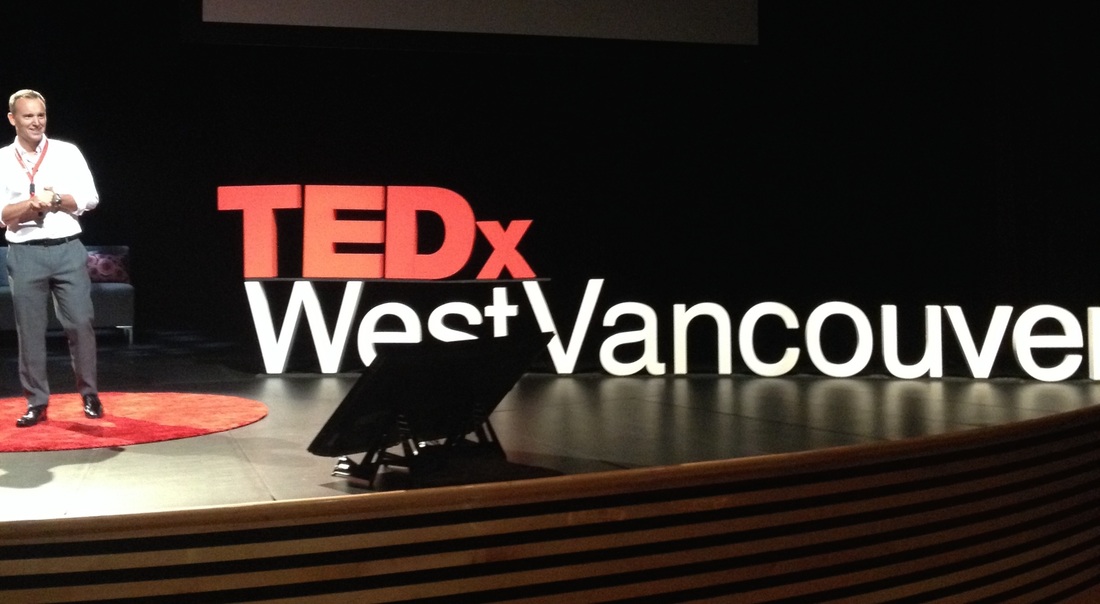 Last weekend I attended the one-day TEDxWestCVancouverEd event at the spacious and always pleasant Kay Meek Theatre in, yes, West Vancouver. It was the second time that a TED licensed event with a focus on education took place on Vancouver’s north shore and some three hundred people of all ages turned out for this event. Compared to last year’s one hundred that probably was some advance evidence that it probably would be a worthwhile get together.
And it was. There were some twenty speakers who each took on education from their perspective, all interspersed with a few 4-minute power talks about the changed meaning of the word 'smart'. It would be beyond the scope of this review to highlight and review all speakers, but a few stood out for me. One of the school district’s own librarians, Arlene Anderson focused in on the changing culture of reading and how mobile devices and other trends have basically disrupted the art of reading in a negative sense. Arlene argued we have to find our way back to immersive and deep reading and she ended her talk with the much needed statement ‘print is an elegant medium’ which brought home the essence and importance of reading to all. Things got a bit more serious with the very personal account of Olympian Silken Laumann who encouraged all to bring in the ‘vulnerability-quotient’ in order to show a bit more of ourselves, weaknesses and all, so that we can learn more from each other. It reminded me of the well-known American venture capitalist Brad Feld who only a few years ago stunned the world with his open account of his struggles with depression. The afternoon speakers that stood out were Judy Halbert and Kris Magnusson, both of whom focused on how we can help students overcome obstacles and Judy’s case specifically was, at least in my mind, one of the best. In her talk entitled 'Getting beyond No' she challenged the traditional ‘no’ many students get when they try and carve out their own learning route and that it is crucial that we listen to them when they indicate where their interest levels and learning routes are. The video of Clifton, the boy that was finally allowed to show the piano playing skills he had learned on his own from YouTube, was a fitting, uplifting and somewhat emotional moment to close the day. As mentioned, the clever thing about the day was the four short chats about the term ‘smart’ and how it had evolved over the years. They acted as a central theme running through the day. Former lawyer and now actor Josh Blacker educated the audience on his struggles as an unhappy lawyer and how making hard and often financially challenging choices delivered him from the constraints that his original career driven education had put upon him. In one swoop Blacker tied together the separate pieces that most speakers had given us, namely that it is the individual student, no matter what age, who in the end sets the curriculum and its ultimate direction. Bringing this into practice is of course harder, but as the attendees strolled away in the early fall sun it was clear that there is no shortage of thought provoking ideas to help us propel in the right direction. Kay Meek has a capacity of five hundred and so there is a good chance the place will be sold out at next year's TEDxWestVancouver Ed. Photo: organizer and West Van educator Craig Cantlie opens the day at the Kay Meek stage. Other organizers were Cari Wilson, Brooke Moore and Garth Thomson. As part of my business practice I have started a few years ago to give all CEOs and other close associates I work with a book for Christmas. I do this because I like sharing something and also take the opportunity to let others learn a few things that I think are worthwhile or feel we need to pay attention to. It started with Sonia Arrison's 100+ which talks about how we will all live much longer, followed by Brett Wilson's Redefining Success in 2013. Last year it was Zeke Emanuel's Brothers Emanuel which describes the journey of three incredibly successful brothers one of whom became Obama's chief of staff and Mayor of Chicago. All of these books of course had a deeper message about learning and education. The one that contained a really direct point of view on education was Brett Wilson's book and here is what I wrote in the letter accompanying each book: Although I do not watch TV anymore (old media!) I did notice that Alberta-entrepreneur Brett Wilson had become some sort of a celebrity in Canada. As I found out during a book lunch he gave in Vancouver last month, Wilson has a lot more to talk about then just business and making money. His personal journey through many ups and downs combined with his focus on integrity and giving back are worth learning from. More than that, he points in the direction of how the next generation should take on the economic challenges ahead and that being an ‘entrepreneur’ is an attitude that applies not just to business, but to any job or role in society. All of this impacts how we look at education, the way we do business and how we shape the communities we live in. West Vancouver's superintendent of schools Chris Kennedy wrote a blog post about the book and you can find it here. Excerpt: Wilson argues for the importance of “teaching marketing, entrepreneurship and philanthropy beginning in elementary schools and continuing into all higher learning, either academic or in the trades.” Given the excitement and engagement with Me to We, and similar movements often done as an “add-on” to curriculum, he makes a persuasive argument that these areas should actually be part of core schooling – a course, he suggests, in changing the world. Wilson says that the ways in which anyone can make an impact on, or in, the world comes down to offering their time, money or leadership. I would say read both Wilson's book and Kennedy's blog post. As for this year's Christmas gift, lots of candidate books and no decision has been made as of today, but I will make sure to blog about it on this site once it has come out as the annual Christmas gift.
Here is one of those snippets of news that highlight what the generation that is now going through the school system is up against. Income inequality is increasingly an age issue where younger people entering the workforce will have a much harder time to make ends meet as opposed to their parents, according to the Conference Board of Canada today: “Increasingly it’s clear that Canada doesn’t have a problem with a declining middle-class; rather it’s a problem of income and wealth inequality for younger generations,” he said. To me this means that we will have look that much harder at what 'work' will be like tomorrow and what the real value is of university education when it means students have to incur vast loads of debt to obtain degrees that no longer hold the value they once had. It will require a radical overhaul in thinking about how we educate and to what end goal.
When I started out in my role as PAC Chair in September 2007 our parent team was immediately confronted with a huge issue. The province had determined that many play structures around British Columbia were no longer compliant with safety regulations and had to be replaced within short order. Of course, our school fell into that unlucky group and we were asked to ensure that the non-compliant playground was replaced sooner rather than later. And no, there were no funds so it was up to us to finance it. And, we were told, most schools take years to get the funding together and given the price of modern play structures, bake sales wouldn't really cut it. Thanks to a great PAC team and very supportive community we pulled it off and a new playground was unveiled at the Lions Bay School on the first day of school in September 2008. This ironically was the day that the big financial meltdown got underway and I always wondered if we would have been able to raise the funds if we had started our playground campaign a year later.
Although a great success, I remained puzzled by the funding mechanisms that underpin our public schools. On the one hand it is great to give certain fundraising efforts to parents to get them involved and give them a sense of ownership in schools. But on the other hand this works only in so many school districts. Many areas will not have the luxury of being able to repeatedly access a community for funds or corporate gifts. And more pressingly, what if provincial coffers dry up further and PAC fundraising is required to buy basic necessities or help maintain facilities? And will a relationship between parents and schools that is increasingly built around money and budgets not become strained over time? Food for thought and time to have an open debate about the funding structures on which our public schools are built. The Lions Bay students bus to Gleneagles and Rockridge at 7:40 AM and 8:00 AM respectively. The parents are quite happy with that routine as it is a hard line in the sand: "get out of bed otherwise you will miss the bus!" We never know exactly what goes on in the bus, but we do know it a fantastic service that connects our community with West Vancouver and gets our kids in school on time, safely.
Photo made by my good friend Norman Pellow in May 2008. As I am gearing up for the November 15 election for school trustee, I thought it would be important to outline what I think are the key issues facing public education and what I will focus on as elected trustee:
THE FUTURE: A Changed Landscape for Education Globalization and the proliferation of new technologies have forever changed the job market. The cradle-to-grave career that we were raised on in the late 20th century has pretty much evaporated overnight and so it is our challenge to ensure that education – in its broadest sense – prepares the next generation for an era of uncertainty and volatility, but also one of immense opportunity and creativity. The enormous amount of information now offered by the internet requires critical thinking, judgment and the skill set to purpose technology to an individual’s advantage. This is a multidisciplinary task that includes mathematics, languages, social studies and equally important: arts. As many experts have pointed out, our current education system is a 20th century legacy and it is time to move beyond that. My Goal: I want to ensure our schools are able to adapt to this new global technology driven landscape and are given all the necessary resources to accomplish this. Schools need to contribute to raising creative, resilient, tech savvy, multilingual, global citizens who have the foundational skills to reinvent and have multiple careers. THE SCALE: Maintain and Improve Current Scale In this age of cost cutting and rationalization there is a strong tendency to amalgamate structures and processes in the belief that ‘bigger is better’ and that larger operations deliver the efficiencies we need. That may be true in some cases, but merging school districts and closing smaller schools accomplishes the exact opposite of what schools need to do to effectively deliver personal learning experiences: small scale settings where students, parents and staff can work together to deliver the best possible learning outcomes. Smaller organizations allow for flat, open and better communication channels between students and teachers, parents and teachers, teachers and administration. My Goal: I will strongly support the independence that school districts have now and where possible seek to enhance this independence while at the same time supporting and nurturing smaller schools and their unique learning environments. OUR SOCIETY: Work to Preserve Civil Society Our open and democratic society with its freedoms and rights is not a given. A long battle was fought for this by previous generations and today we are witnessing the erosion of such core values as ‘respect’, ‘participation’ and ‘responsibility’. So all of us will have to work for and recreate our civil society every single day. The recent labour conflict revealed that even our carefully calibrated institutions can not always adequately absorb and resolve conflict. We consequently run the risk of not only setting a terrible example for our students, but also of a steady fraying of the social structures that underpin our society. My Goal: As a school trustee I will make it a top priority that we realize that not a lot is needed to see a breakdown in this social order and that all parties need to work together, every day, to maintain and build out our success as a free, open and shock absorbent society. The art of compromise is central to that. THE BUDGET: More Learning Support, Courses and Resources It has been clear that BC schools do not always have the staffing and resources they need to fully deliver the curriculum, in particular if we take into account the changing needs of students and demands of that rapidly changing global landscape mentioned before. Continued investment in staff, technology, facilities, extracurricular activities and materials is essential. Public schools also compete with private schools, homeschooling and other options open to families nowadays. And school districts also compete for talent, so how do we attract the best teachers and administrators? My Goal: I want to start to seriously look at how we can better leverage our resources and find alternative funding mechanisms so we can deliver what our students need and what our staff requires to deliver the education that enables students to compete and cooperate, but also enables the school district to compete effectively with alternative schooling options. THE COMMUNITY: Build Partnerships Relations between provincial and local entities are not always optimal and so it is with school districts. School districts need to increasingly carve out their own identity and build strong local partnerships to complement and improve on that what is funded or given from higher levels. In other words: there is a strong need to build and deepen partnerships locally with municipalities, businesses and community organizations. My Goal: I want to start developing local initiatives where more joint use of assets (think about the fact that many school buildings remain unused for 50% of the calendar year), and creating partnerships with local profit and non-for-profit entities widen that ability of school districts to operate effectively. |
Education and School Trustee BlogArchives
September 2018
Categories©2014 - 2017 by Pieter Dorsman
|
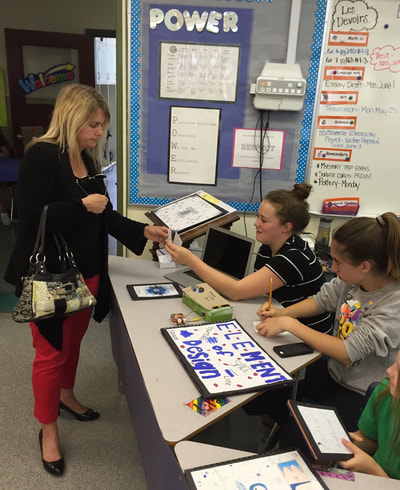
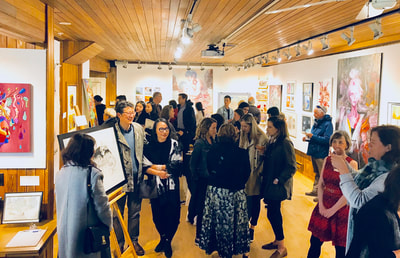

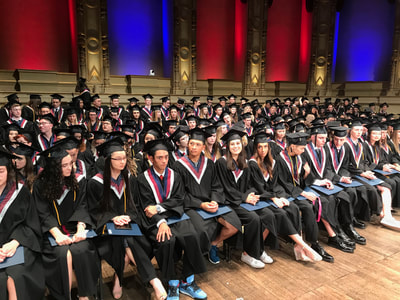
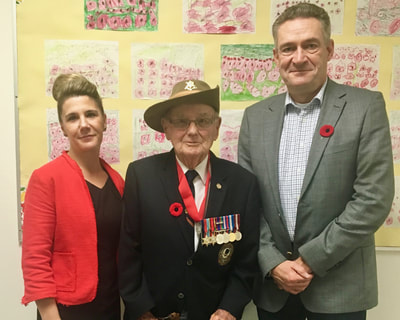
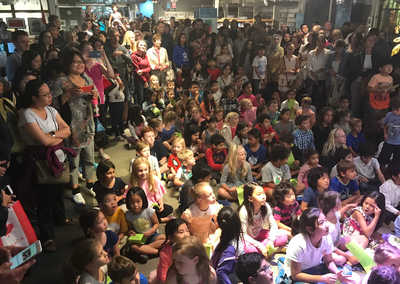
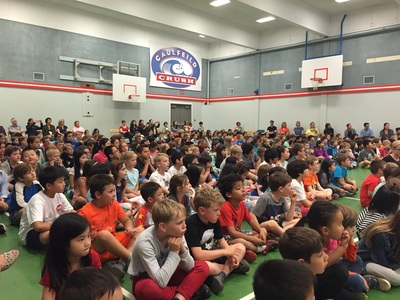
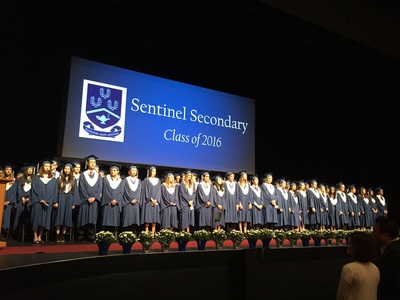

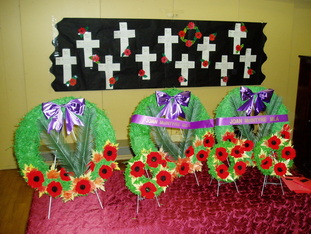
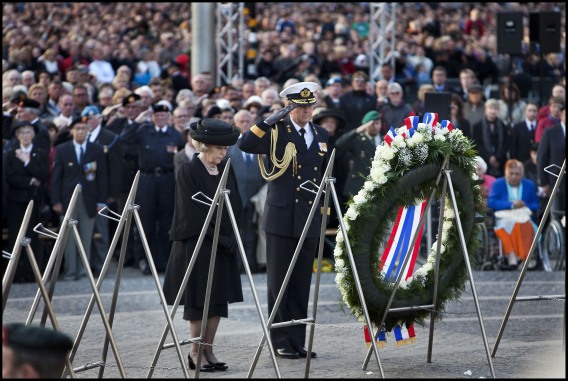
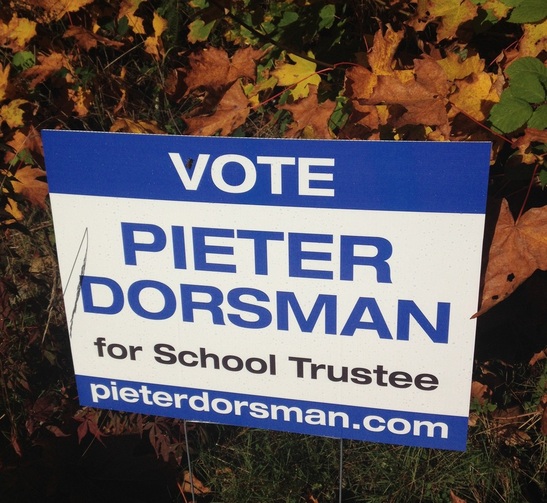
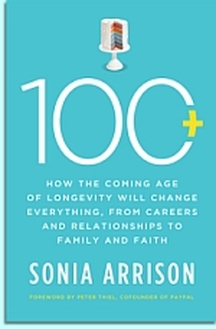
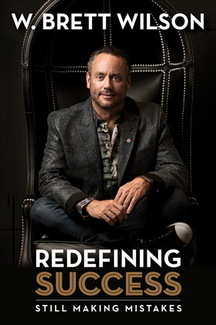
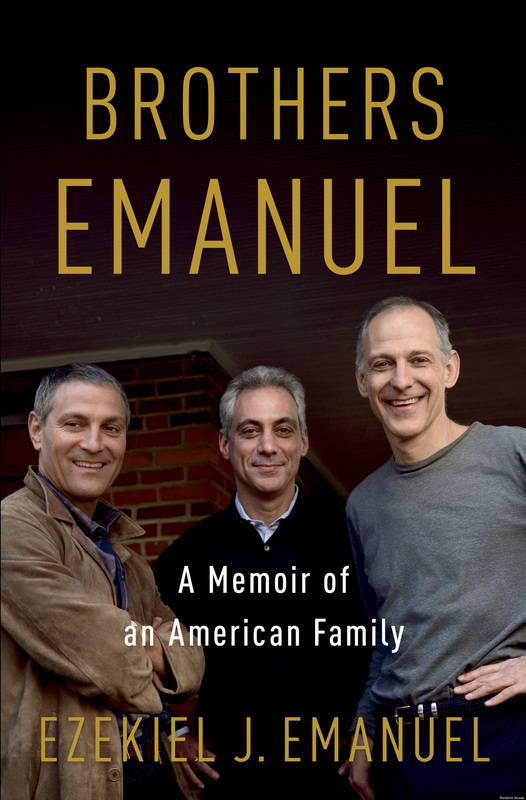
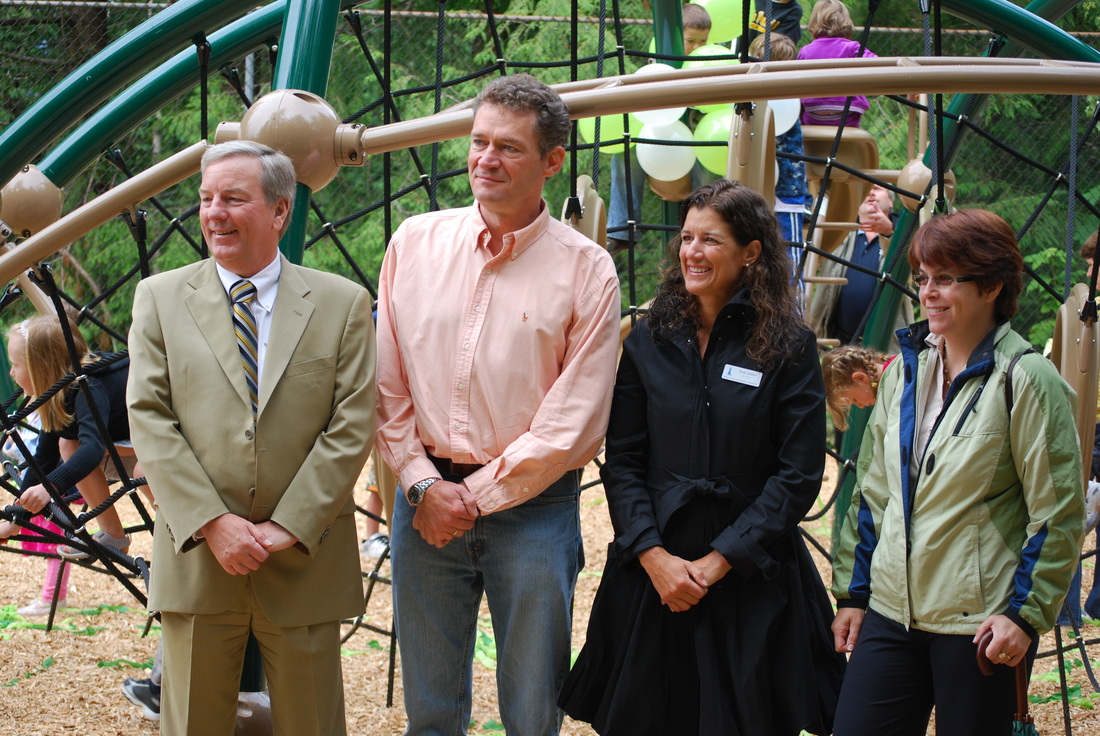
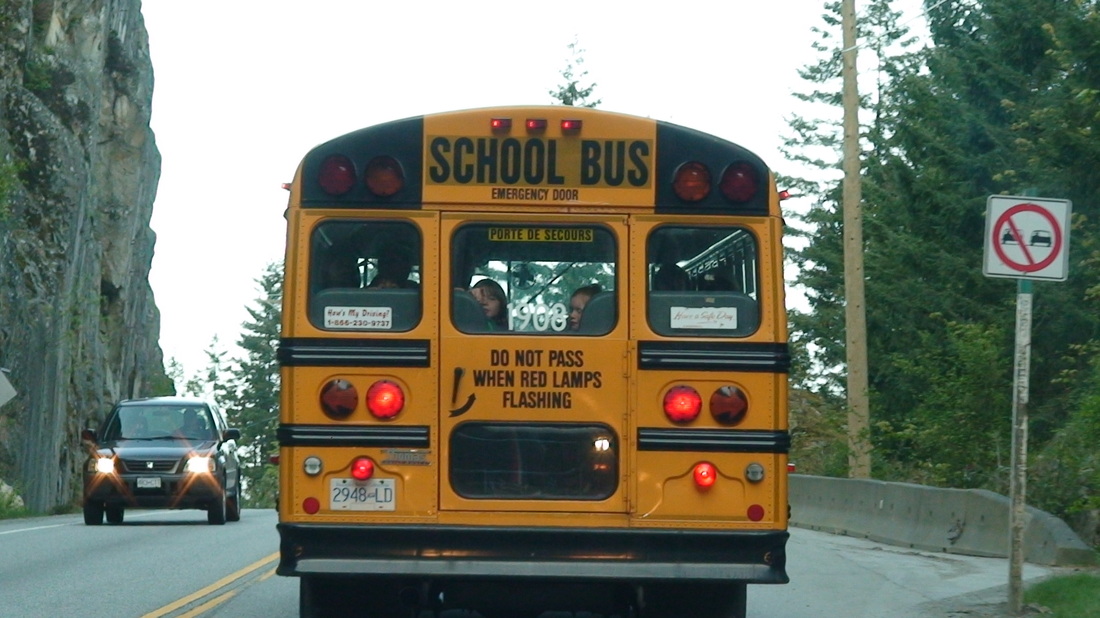
 RSS Feed
RSS Feed